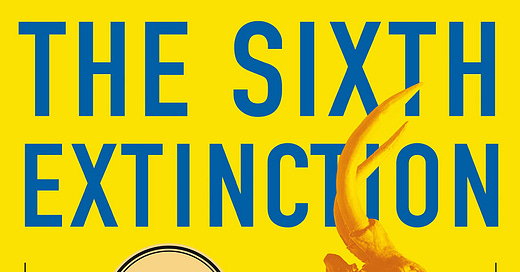Happy Earth Day!
This is my annual Earth Day post. Last year I wrote about “How to Avoid a Climate Disaster” by Bill Gates and you can read that here.
I won’t be able to remember all the facts and figures from this book, but I hope to capture some of the feelings I had while reading, such as:
Gratitude for the scientists and -ologists that spend time in nature studying plants, animals, insects, coral reefs, and forests, who document their findings, and care for the earth.
A determination to reduce my emissions and overall carbon footprint and a sense of urgency that I need to take action now.
Bored at times because beetle and bat counting can be tedious and the Latin names for things don’t really interest me. Can’t we just call it a special frog?
What’s it about?
Kolbert outlines five mass extinction events that have occurred during earth’s history and explains the conditions currently being monitored that lead scientists to believe that a sixth extinction is imminent. The five previous events dramatically altered the diversity of life on earth and the sixth would be no different.
What did I like about it?
Kolbert certainly stirs a need for action without being overly critical. I love that she didn’t just reference studies and research, rather she went out and got boots on the ground at research sites and spent time with the lead scientists. There are points and counterpoints and opinions and hypotheses about what the future holds for the living things on planet earth. I’m not sure anyone can know for sure, but we can look at the data and make educated predictions (some more educated than others).
What we do know for sure is that humans have made such a significant impact that humans also have to be committed to lessening that impact. Awareness and lack of ignorance must result in effort. She makes this point near the end:
To argue that the current extinction event could be averted if people just cared more and were willing to make more sacrifices is not wrong, exactly; still, it misses the point. It doesn’t much matter whether people care or don’t care. What matters is that people change the world.
Now what?
I keep thinking about the statement: People change the world, whether we care or not. People change the world, for good or bad. People are the problem but also the solution. We can measure and track how the earth is changing using methods and technologies that we come up with. I work for a company that puts cameras and other instruments in space to gather data - it’s cool! We can use the data to make positive changes instead of negative ones. We can do this.
I plan to celebrate Earth Day by biking to work along the highway 36 bike trail and enjoying the beautiful view of the Flatirons as I descend into Boulder. How do you commemorate Earth Day, either today or all year long?
Thanks for reading,
Kyle




